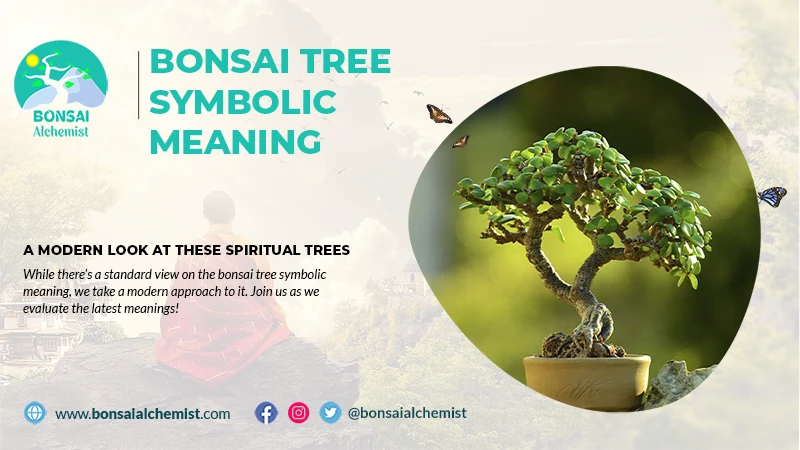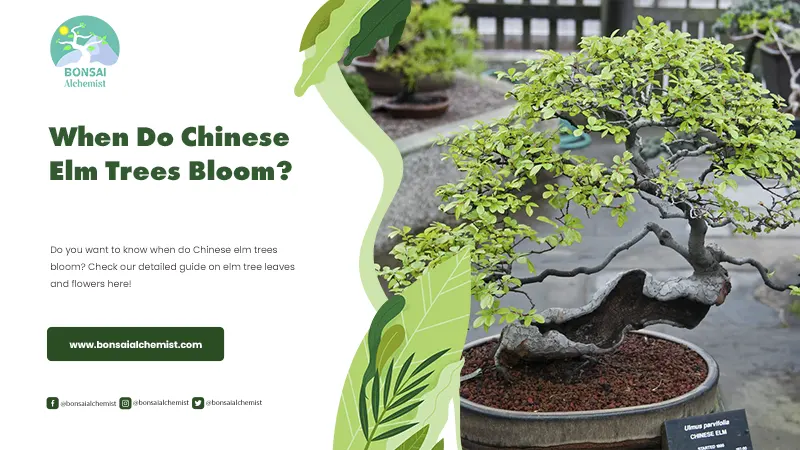Bonsai Tree Symbolism and Meaning
The Bonsai art form has been practiced for centuries, and bonsai tree symbolism and meaning have evolved through this time.
A Bonsai tree basically combines the best parts of a houseplant and a pet in many ways. A Bonsai is a living, growing entity that will bring joy and a sense of accomplishment to your life without being overly demanding or damaging the environment around it. It’s a lifelong companion that will most likely outlive you to bring joy to others.
Every element and detail of this art form is planned and executed in meticulous detail, and all elements are combined to craft a story told through the aesthetics of the tree. There are many deeper meanings and symbolism within each tree, and each bonsai is created to elicit different emotions from the beholder.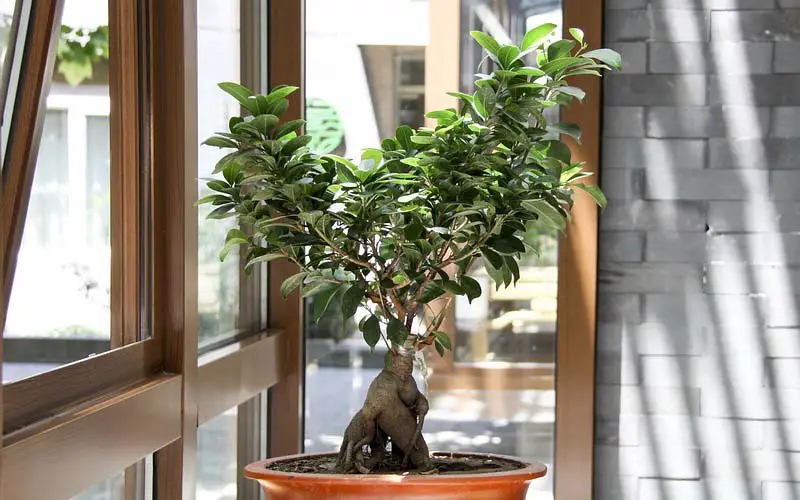
Table of Contents
What is a Bonsai?
A bonsai tree is a miniature version of a full-sized tree that has been grown to make it look like a full-sized tree. It is an artistic representation of a full-sized plant in nature. Many kinds of trees can be turned into Bonsai with skill, care, and patience. Bonsais are normally grown in shallow ceramic pots.
Some species have characteristics, such as small leaves or needles, that make them more suited for the compact visual scope of Bonsai. These characteristics make these species more popular as bonsai material. Bonsai trees do not come from genetically dwarfed trees but rather from special techniques while growing small trees from regular stock and seeds.
The History of the Bonsai in China and Japan
The ancient art of creating miniature trees originated in China in 700 CE. The Chinese used a unique technique called “pun-sai” to grow dwarf trees in containers. In an attempt to recreate the natural dwarf trees found in the mountains, they used pruning and binding techniques to give plants more twisted shapes and an aged appearance. The Chinesei trees are meant to be a miniature representation of nature, planted within decorative containers.
Bonsai creation was done primarily by the elite in society until the art form was introduced into Japan during the Kamakura period. Bonsai in Japanese means “tree in a pot,” and the Chinese word “pun-sai” means scenery or landscape in a pot.
Japanese Zen Buddhist monks learned the punsai technique from Chinese monks and developed their own methods for creating mini trees, resulting in different styles, and these trees became known as Bonsai. By the 14th century, bonsai trees were regarded as a highly respected art form and stood in monasteries and the homes of royalty.
Bonsai trees became available to people of all social classes during medieval times that ranged from 1185 to 1603. This meant that more people had to learn the art of Bonsai, and these trees became commonplace across Japan.
You can read more about the history of bonsai here.
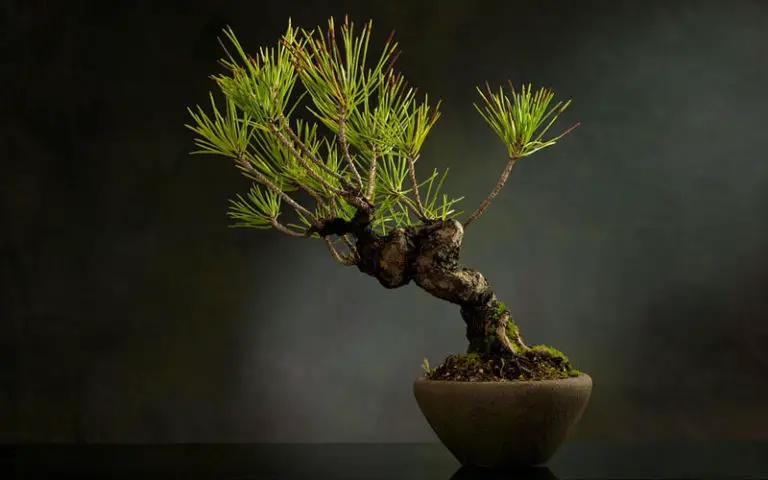
The Symbolism of the Bonsai Tree
The cultivation of bonsai trees requires a lot of attention to be paid to everything that relates to the growing of the tree. Proper care must be provided for the tree to survive and thrive. There are many representations of the Bonsai tree, each with its own symbolic meaning.
Some of the common meanings and bonsai tree symbolism include wealth, harmony, and balance.
We have a detailed bonsai tree care guide with all the relevant information. Check the guide out here!

Wealth
This small and beautiful piece of nature was used by the wealthy in Japan to decorate their homes. The care given to these trees is unique and time-intensive, adding to the symbolic wealth associated with them. The presence of a Bonsai tree can symbolize wealth and abundance.
Harmony
The bonsai tree symbolizes the relationship that exists between man and nature. It also reflects the harmony of nature as you grow a bonsai that is a miniature reflection of a tree in the wild.
Balance
The bonsai reflects the balance between the old tree, which has been in the soil a long time, and the new way it has been created through special skills and abilities. It symbolizes the balance that exists between the different lives that exist for each person.
Meaning of the Different Bonsai Tree Types
Bonsai tree symbolism has different representations depending on the type of tree. The symbolic meaning of some of the more popular bonsai trees is listed here.
Azalea Bonsai
Azalea bonsai is a beautiful symbol of femininity. Its bright pink blossoms represent feminine beauty, vulnerability, and gentleness. It is a popular gift to women. Also associated with an Azalea bonsai are abundance, passion, wealth, and love, with abundance applying to wealth, intelligence, and beauty.
Ficus Bonsai
The Ficus bonsai is often called the cheerful tree, and it is thought to enhance the moods of those nearby. Ficus Bonsai is said to symbolize unity, new beginnings, abundance, simplicity, and nature’s harmony. Having a Ficus in the home is believed to release positivity and understanding. Ficus is one of the most popular indoor Bonsai because it is easy to care for and makes a great gift.
Boxwood Bonsai
Boxwood is an evergreen Bonsai tree native to western Europe, North Africa, and West Asia. Boxwood tree wood was used for shelter and throughout the Christian faith across history. The Greeks and Romans made tablets from this wood. Due to the slow growth, high longevity, and all-year-round foliage of this tree, it represents immortality.
Jade Bonsai
The Jade bonsai is said to produce positive vibrations and attract good luck, money, and prosperity into your life. It’s known as the lucky money tree, the money plant, and the friendship plant.
The vibrant green leaves of the Jade tree symbolize energy, growth, renewal, and great friendship. It is a common gift to business owners to bring prosperity to the business. It’s considered very auspicious to place a Jade tree in the southeast corner of the room or desk.
Juniper Bonsai
The Juniper tree makes for a long-lived, coniferous evergreen Bonsai. It symbolizes protection and is said to ward off evil spirits. The tree represents cleansing and purification, and some trees grow berry-like cones that are used in rituals connected to good health and healing.
The Juniper bonsai tree is also seen as a symbol of power and strength and the ability to overcome life’s inevitable challenges.
Cherry Blossom Bonsai
The Cherry Blossom Bonsai is associated with mindfulness, mortality, and living in the present moment. The delicate pink flowers bloom for a very short time reminding us that life is to be lived fully in the moment. The Cherry Blossom also represents female dominance, strength and beauty, and renewal and rebirth. It is Japan’s national flower and has deep cultural significance.
Chinese Elm Bonsai
The Chinese Elm symbolizes inner strength, intuition, wisdom, and love. It is also known as the tree of harmony. The Elm is thought to be magical and capable of offering predictions and protection. It is often planted in front of homes and churches as a good omen.
Maple Bonsai
The Japanese Maple tree is associated with elegance and beauty with its bright red, yellow, and orange foliage in Autumn. Maple bonsai is known as a symbol of peace, serenity, balance, and practicality. The Japanese word for Maple translates to “peace” or “calm.”
Cedar Bonsai
Cedar trees symbolize immortality, strength, and protection due to their conventional size, shape, and longevity. The bark and leaves of the Cedar tree are used as incense and medicine and are considered a purifying herb. The Cedar tree is commonly associated with medical healing, protection, and prayer. Cedar leaves and bark are used as medicine.
Oak Bonsai
The Oak bonsai is a symbol of strength, longevity, and knowledge with their strong trunks and long lives. Oak trees have been associated with powerful gods in various cultures and are thought of as a storehouse of spiritual wisdom.
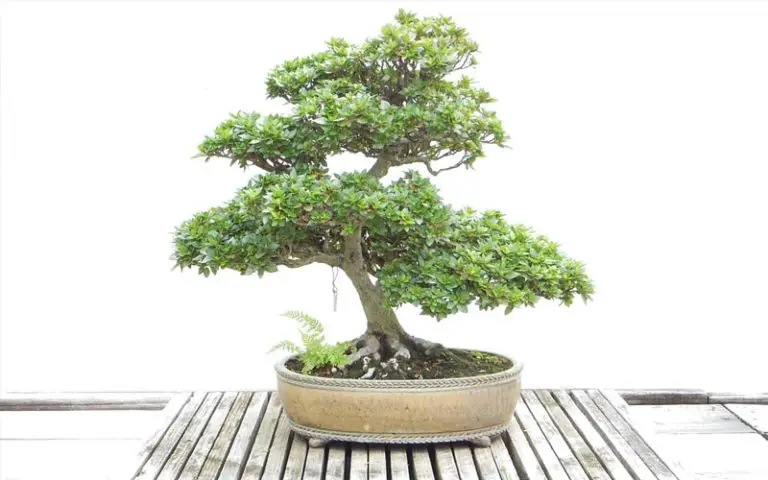
Final Thoughts
Bonsai trees promote positive energy and help ease anxiety and the attainment of inner peace and serenity. Therefore, it is essential to consider the energetic associations and the symbolic meanings behind a tree before selecting one to give or add to your collection.
Giving a Bonsai as a gift is said to double the fortune that is found by the recipient. This living piece of art invites care, nurturing, patience and positivity into your life. They represent peace and harmony with nature.
FAQ About Bonsai Tree Symbolism And Meaning
A few questions commonly raised regarding the meaning of Bonsai trees are discussed below.
Bonsai meanings are significant when you plan to give a tree as a gift to someone. Bonsai is general, symbolizes harmony, peace, an order of thoughts, balance, and all that is good in nature and makes great gifts.
Bonsai trees bring positive energy and nature to the home. Both the positive energy and nature are associated with the major principles of practicing Feng Shui to increase the harmony and prosperity in each home and family.
The poem is entitled “Bonsai” because love is to be cultivated much like a bonsai. The meaning captured in this poem is about how love is simplified and reduced so that one can give it out to others.
Bonsai trees do not have magical properties, but they are known to bring peace, balance, and harmony. In today’s crazy lifestyles, this is a type of magic in itself.


